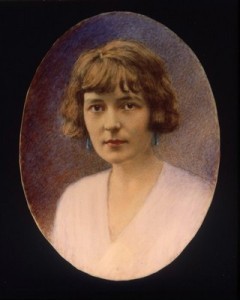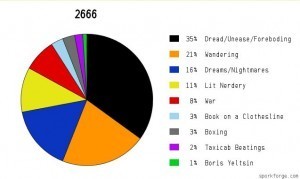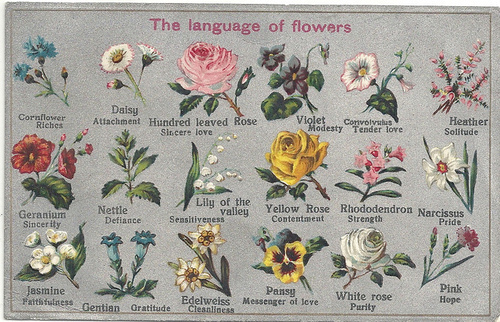The Paris Review's Blog, page 846
February 19, 2013
A Week in Culture: Claire Cottrell, Art Book Shop Owner and Editor
DAY ONE
7:00 A.M. Wake up to dog barking and strong skunk smell in house. Fear that door to garden was left open and skunk is loose in house. Get out of bed to confirm. Garden door is not open and skunk is not loose. Go back to bed for thirty minutes.
7:30 A.M. Get out of bed. Wash face. Gather belongings, including black cocoon coat purchased for an imminent trip to Paris found for sixteen dollars the day before at a second-hand store. Head home to Mount Washington.
8:00 A.M. Arrive at home. Make tea. Take daily vitamins. Make new favorite quick morning oatmeal: half cup of oats, two heaping tablespoons of maple syrup, cinnamon, chopped apple, fresh dates, walnuts, boiling water. Settle in to enjoy oatmeal and tea. Realize that laptop, aka lifeline, is in Amos’s car. Freak out. Cancel all morning obligations, citing laptop debacle. Text Amos.
8:05 A.M. Amos drops off laptop.
8:10 A.M. Finish oatmeal. Finish tea. Resume all morning obligations. Including: reviewing reactions to Sybil’s sad demise on last night’s Downton Abbey, looking at Atelier Bow-Wow’s pet architecture—otherwise known as teeny tiny buildings on teeny tiny sliver of land—for an article, researching Bruno Munari’s useless machines for a contribution to the new arts journal, synonym. 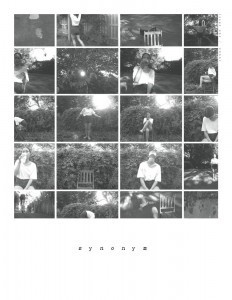
9:15 A.M. Tackle e-mail. Respond to e-mails from three weeks ago. Debate including ‘apologies for the delayed response.’ Decide against it thinking, No need to always apologize. For all they know I answer e-mail every few weeks because I live in a cabin removed from civilization and spend most of my time in nature. Read More »
The Worst Poet in the World
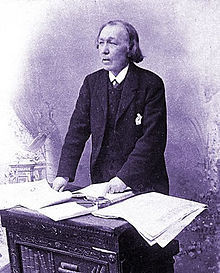 The handwritten manuscript of a poem by the man considered the worst poet in the English language, William Topaz McGonagall, is expected to fetch up to £3,000 at auction. While the doggerel-esque verse, “In Praise of the Royal Marriage,” is certainly no threat to Tennyson, it doesn’t seem worthy of the dead-fish and rotten-egg tributes the Scottish bard’s performances regularly elicited on the music hall stage. His most infamous work is probably “The Tay Bridge Disaster,” commemorating an 1879 bridge collapse in which numerous train passengers were killed; it is either a masterpiece of outsider art or of insensitivity.
The handwritten manuscript of a poem by the man considered the worst poet in the English language, William Topaz McGonagall, is expected to fetch up to £3,000 at auction. While the doggerel-esque verse, “In Praise of the Royal Marriage,” is certainly no threat to Tennyson, it doesn’t seem worthy of the dead-fish and rotten-egg tributes the Scottish bard’s performances regularly elicited on the music hall stage. His most infamous work is probably “The Tay Bridge Disaster,” commemorating an 1879 bridge collapse in which numerous train passengers were killed; it is either a masterpiece of outsider art or of insensitivity.
Beautiful Railway Bridge of the Silv’ry Tay!
Alas! I am very sorry to say
That ninety lives have been taken away
On the last Sabbath day of 1879,
Which will be remember’d for a very long time.
Hear That Lonesome Gasket Blow, Part 4: Tonight the Sea Is Douce
On the Saturday closest to my thirtieth birthday, I went out on the town with Andrew and Izzy, two of my Highbury flatmates. With my time in dreamy Wellington drawing to a close—to say nothing of my waning metabolic rate—the need to run a little wild at the end of an afternoon spent contemplating fiction felt realer than ever.
To this end our trio wound up, at three in the morning, after hours of dancing, walking toward a Burger King on the corner of Cuba and Manners. This Burger King occupies the ground floor of a heritage building with an Edwardian Baroque façade. Once home to the first Te Aro branch of the Bank of New Zealand, the building now shoulders what the local government describes as “considerable townscape significance.”
“My uncle used to be the president of Burger King,” said Andrew, sitting across from me and eating fries. The Burger King before us teemed with loud, drunken revelers.
“I can one-up you,” said Izzy. “My grandfather used to be the chairman of the National Front.”
“What’s the National Front?” I asked.
“You don’t know what the National Front is?” said Izzy. “Are you kidding me? Fucking Americans!”
“Look,” I said. “I know about a lot of things outside of America. I can’t know about all of them.”
“You know what the Klu Klux Klan is,” said Izzy.
“Well, of course.”
“It’s like the Klan, but in the UK.” Read More »
Cake and Pie, and Other News
2666, in pie-chart form. (Black, in case you were wondering, represents “dread, unease, foreboding.”)
Not merely one book-themed cupcake, but a series. (We look forward to 2666.)
“Let us not speak of the cookbooks.” A pair of academics attempt to organize their library.
There is no Hilary Mantel–Kate Middleton feud!
Mantel just called the duchess “a jointed doll on which certain rags are hung ... without quirks, without oddities, without the risk of the emergence of character.” And no Anne Boleyn.
February 15, 2013
Masterpiece Theatre: Universal Soldier: Day of Reckoning
My favorite movie of last year—the best movie of last year, I would argue—wasn’t nominated for any Academy Awards. It wasn’t even part of the conversation. That’s because the movie is Universal Soldier: Day of Reckoning. You might think I’m just being ironic, that I’m taking pleasure in saying what no one else is saying. The latter may be true but the former is not. This movie is a secret masterpiece.
Universal Soldier: Day of Reckoning is a movie Werner Herzog, David Lynch, and Shivers-era David Cronenberg might make if they teamed up to shoot a Bourne knockoff in Louisiana on a shoestring budget. This thought experiment works even better if we imagine Gaspar Noé dropping by the editing room later on.
The actual director, John Hyams, has a distinctive voice and style. He and his cinematographer, Yaron Levy, create a nightmare-scape of blighted semisuburbia through which the hero drifts like a damaged samurai, occasionally getting sucked into maelstroms of berserk, finger-hacking, foot-severing violence. The compositions are beautiful. The cheapness of the sets only enhances the lush and lurid atmosphere; everything seems hypnotic and dreamlike. Interiors look like Gregory Crewdson photographs and exteriors look like William Egglestons. This is not your standard VOD action movie. Read More »
B is for Bookseller
What We’re Loving: Fictional Memoirs, Unreliable Narrators
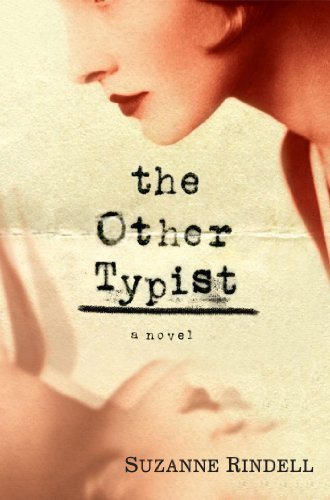 As we close our Spring Issue, plan our Spring Revel, and try to find a new office, I’ve been taking refuge in two books at once. At dinner I’m reading Edward Limonov’s outrageous and very funny “fictional memoir” It’s Me, Eddie, about living as a penniless émigré in a New York SRO. In later years, Limonov has had a confusing political career (he may be the only living Russian poet to have raised a private army or campaigned for Zhirinovsky), but back in 1978 he was pure punk. After dinner it’s the new translation of Climates, by André Maurois, an irresistible, micro-Proustian novel about a jealous husband and the woman who tries to save him. I can’t explain why these two books go so well together, except to note that each one broods on a painful breakup, and that I don’t want either one to end. —Lorin Stein
As we close our Spring Issue, plan our Spring Revel, and try to find a new office, I’ve been taking refuge in two books at once. At dinner I’m reading Edward Limonov’s outrageous and very funny “fictional memoir” It’s Me, Eddie, about living as a penniless émigré in a New York SRO. In later years, Limonov has had a confusing political career (he may be the only living Russian poet to have raised a private army or campaigned for Zhirinovsky), but back in 1978 he was pure punk. After dinner it’s the new translation of Climates, by André Maurois, an irresistible, micro-Proustian novel about a jealous husband and the woman who tries to save him. I can’t explain why these two books go so well together, except to note that each one broods on a painful breakup, and that I don’t want either one to end. —Lorin Stein
I’ve been paging through the late Richard Stern’s Still on Call, a collection of essays, reflections, and general miscellany. In one section, Stern describes his encounters with other writers, including a near-stalking of Sinclair Lewis in Central Park and a leisurely lunch with Thomas Mann, but it was Stern’s meeting with “Japan’s most distinguished poet,” Shuntarō Tanikawa, that especially interested me. Unfamiliar with Tanikawa, I tracked down a translation of his 1980 collection, At Midnight in the Kitchen I Just Wanted to Talk to You, and felt an immediate affinity after reading “My Favorite Things,” Tanikawa’s take on Oscar Hammerstein’s famous lyrics. If you can’t get your hands on a copy of the collection, you can still read the poem here. —Brenna Scheving
Who writes a novel-length lipogram, and furthermore, who translates it? Sadists? Cat lovers without a cause? Georges Perec and Gilbert Adair have, respectively, accomplished this feat. A Void (translation of the French title, La disparition) could rescue you from the winter doldrums as a cerebral, cleverly disguised detective tale. Written sans the letter e, it forces you to acknowledge the absence while following the protagonist, Anton Vowl. In this paragraph alone, I have used e sixty-two times. If you need further evidence of Perec’s merit as a writer, look at his author photo. —Kendall Poe
I picked up a galley of The Other Typist on a whim, and from the first page was absorbed: I haven’t been able to put it down. Suzanne Rindell’s story of a 1920s police stenographer who becomes increasingly obsessed with a glamorous new typist reminds me at points of Notes on a Scandal and Patricia Highsmith, but has creepy charms all its own. —Sadie Stein
America in Love, and Other News
Amazon.com has assigned a love story to every state. As a New Yorker, I find myself ambivalent about the choice of The Age of Innocence. Although Arkansas, arguably, has more of a bone to pick.
“Wife wanted: intelligent, beautiful, 18 to 25, broad-minded, sensitive, affectionate. For accomplished artist and exciting life. NYR box 1432.” On America’s most erudite personals. (Yes, that was the first.)
Happy one hundred, Harvard University Press.
Comic-book vendors around the nation are boycotting D. C. Comics following the announcement that the company has asked Orson Scott Card to write part of an upcoming Superman. Card is an outspoken antigay advocate.
Meanwhile, a plan to erect a plaque to Enid Blyton in her hometown is tearing Beaconsfield, England, asunder: some claim it would be wrong to celebrate an author whose work is now deemed racist and sexist.
February 14, 2013
Riding with Edna St. Vincent Millay: A Love Story
Three Fourth of July weekends ago, on a crowded Hampton Jitney, beach bag strategically placed so no one could take the seat next to me, I watched a flustered blonde board and sit down directly across the aisle. Think Marilyn Monroe gone boho in the East End swelter. The LIRR had broken down, and she had spent several frustrating hours in the humidity of Westhampton waiting for a train that wouldn’t be fixed.
By contrast, I was cool and composed, having spent the day at a painter friend’s vernissage. At the time, I was a lowly twenty-three-year-old magazine intern and had met the artist while covering an event. Now I was craving some solitude. Slouched and brooding, knees tucked up into the seat before me, I closed myself off. Coupled with my tote-bag force field, I hoped my general vibe said, “No conversation please.”
As she threw down the bag slung over her shoulder, I saw she was clutching a faded pink hardcover, a book of collected poems by Edna St. Vincent Millay. I caught her looking at me—a glance I interpreted as one of contempt. People who take up two seats... But when she had settled in and we began to furtively study each other through the half-light, I realized my misappraisal: she was more curious than anything. We tested the limits of our peripheral vision like elementary school pupils.
The captivity of a bus—coupled with the urgency of a short trip—blends with the spontaneity of bus reservations (compared, say, to planes booked in advance) to make chance encounters inevitable and last minute shifts in fate possible. Millay’s poem “Travel,” in retrospect, seems freakily appropriate for the cancelled LIRR and the day’s noisy disruption: “The railroad track is miles away, / And the day is loud with voices speaking, / Yet there isn’t a train goes by all day / But I hear its whistle shrieking.”
She would later tell me she was struck by how relaxed I appeared when she, by contrast, had undergone such an ordeal. How composed my body language, how casual my unbuttoned shirt (truth be told, what she interpreted as Zen was really just exhaustion).
I decided to say hello first, and we started to talk; the memory of the exact exchange is hazy, imbued as the moment was with the fluttering nerves and saccharine rush of a first encounter your subconscious recognizes as significant before you truly do.
She was an actress who nannied in the Hamptons between roles. Judging by my madras shorts and boat shoes, she assumed I was some kind of pool boy. Not quite, but I was probably one of the few on our bus without a family home somewhere between Quogue and Montauk. We playfully guessed each other’s names.
“Vanessa?” I said. (What, does he think I’m some kind of bitch?)
“Joshua?” she tried. (Is it that obvious I’m Jewish?) Read More »
Read Your Flowers
The Paris Review's Blog
- The Paris Review's profile
- 305 followers



